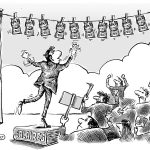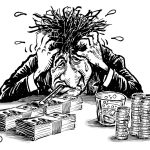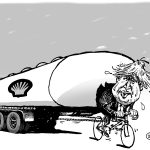50 years of suspension
Benefits and costs of the rapprochement with China and the suspension of the convertibility of the dollar.
On August 15, 1971, President Nixon announced the suspension of the convertibility of the dollar to gold. Exactly a month earlier, he was already shocking the world by revealing the visit of his Secretary of State Henry Kissinger to Beijing, a prelude to his arrival in 1972 and the recognition of People’s Republic of China by the United States. 50 years on, how can we not highlight the concomitance of these two events and examine their consequences?
In the United States, 1971 marked a peak in the protest movement against the Vietnam War, which the President had promised to put an end to. The rapprochement with China is part of the plan to stop the support to North Vietnam. On the monetary level, the illusion of the convertibility of the dollar is no longer tenable: at $35/ounce of gold, the flight of the precious metal has melted US reserves by 68% in the aftermath of the Second World War, to nearly 24% of the world’s reserves. The war has exploded public deficits and debt; inflation is threatening.
In 1973, the generalized floating of currencies was confirmed and in 1976, gold was definitively demonetized. At the same time, the United States, which had maintains official relations with Taiwan and has concluded an agreement of double recognition of China’s unity, will break off relations with the island of Formosa in 1979 – the day after the economic turn decided by Deng Xiao Ping.
China’s inclusion in the global economic and political system has not been accompanied by liberalization of its regime.
The new era opened in 1971 did not mark the collapse of the international monetary system, or even that of the dollar, which still accounts for nearly 60% of the world’s foreign exchange reserves. The dollar also embodies the harsh reality of a system that generates crises, a globalization threatening the balance and perhaps even the survival of the planet, in terms of climate and its biodiversity. China’s inclusion in the world economic and political system has not been accompanied by a liberalization of its regime, which has moved from “market socialism” to “authoritarian capitalism” that is openly assumed. Bitter disillusionment with the second Great, which is now asserting itself as a direct, economic, geostrategic, and monetary competitor of the United States.
On the monetary level, the continued predominance of the dollar has accentuated the “Triffin dilemma1“. From monetary agreements2 to protectionist measures, the United States continues to run a large current account deficit, satisfying the appetite of foreign investors for the dollar, while frustrating local producers and the Administration. But the more the dollar board turns, the more they fear its devaluation. In addition, the growing use of the dollar as a means of control and pressure by the United States on its rivals as well as on its allies, push them to look for new alternatives3.
The founding of the euro allowed its members to free themselves from the internal consequences of the fluctuation of the dollar and US monetary policy. The European “one for all” nevertheless finds its limit in the necessary maintenance of the Atlantic Alliance on the one hand, and the ability of its members to integrate a common budgetary discipline on the other hand. China, which holds large foreign exchange reserves in dollars, can only pose as a direct competitor to America and the dollar. Initially launched as a project with a strictly domestic dimension, the Chinese monetary authorities say they are ready to offer the e-Yuan (Digital Currency Central Bank) as the support of a standard model of exchange and clearing (like SWIFT).
The American withdrawal from the Middle East and Central Asian theaters of operations closes the chapter opened by the attacks of September 11, 2001. It is a continuation of President Obama’s “Pivot to Asia” policy. The commercial, geostrategic and now monetary rivalry between the two great powers has so far growingly resembled a Cold War. Let us fear that it will warm up.
1 Belgian economist who highlighted the economic contradictions linked to the reserve currency position
2 The Plaza and Louvre agreements have caused a sharp revaluation of the Yen and the Deutsche Mark
3 See our article of 11 February 2020 “La douleur du dollar”
Original french version article in allnews.ch Dated Aug 31 2021 Cartoon Barret



